Unlock the Magic in Your Story Now
Get the Free 20 questions to Ask Before Launching Your Idea workbook when you sign up for occasional updates.
Get the Free 20 questions to Ask Before Launching Your Idea workbook when you sign up for occasional updates.
Articles filed in: Worldview
Two Questions For Days Like These
filed in Meaningful Work, Worldview

Will we wake up in a few months and lament that we haven’t made more of this time in isolation?
The direct impact of current events is largely beyond our control. And yet it affects us indirectly, often in imperceptible ways. There are many things going on in the world that we can’t influence, but there is something we can do to minimise their indirect effects on our agency.
We have a choice.
We can allow time to trickle through our fingers as we refresh Twitter and binge-watch Netflix or we can do the things we’re glad to have done.
There are two questions we can ask ourselves at the end of each day.
What did I do today that I’m proud of?
What am I glad I did today?
We can mark time, without allowing this time to make its mark on us—and us on it.
Or we can try to do better each day.
Image by Edwin Hooper
On Resourcefulness
filed in Strategy, Success, Worldview

When things don’t go according to plan.
Remember this isn’t the first time you’ve had to change course.
Make a list of all the other times you pushed through.
Remind yourself of the skills and strengths you previously called on in challenging times.
Tell yourself those stories today.
They will stand you in good stead as you work to change the things you can change.
Tomorrow and the day after.
Image by Neil Thomas
Don’t Be Right, Be Early
filed in Strategy, Success, Worldview
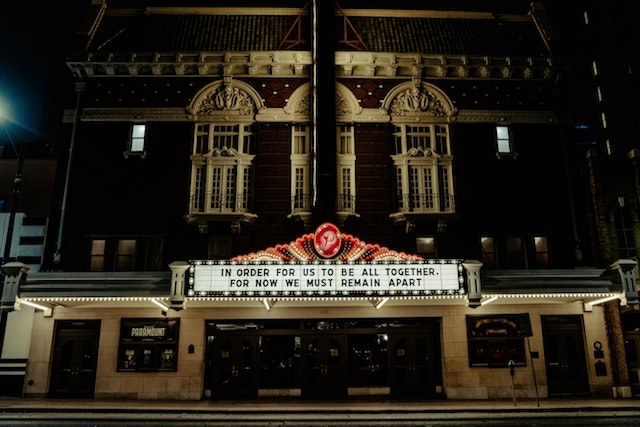
Seven years ago, a member of the Zoom video conferencing sales team worked hard to demonstrate the value of their service to me.
She emailed, she Zoomed, she answered questions. And I didn’t sign up.
‘I will one day,’ I promised. ‘Just not now. It’s just too early for me.’
Which was true.
Few of us could have predicted the extraordinary growth trajectory of a company like Zoom seven years ago.
Nobody would have predicted that thousands of organisations, educational institutions and creatives, would now rely on Zoom to meet, teach and collaborate with colleagues and students in quarantine just seven weeks ago.
In tomorrow’s world, we will forget that Zoom built their business one call, one customer, at a time.
It’s impossible to be sure about our next move as we navigate the future.
It always has been.
Sometimes we have to take the first step without knowing whether it’s the right one.
We can’t always be right, but we can be early.
Image by Britanni Burns
On Certainty
filed in Worldview

Nobody creates from a place of certainty.
You can’t predict the future. You never could. Nobody can.
Despite this fact, you took action in the past.
You made brave decisions without absolute proof.
You loved without knowing if your love would be rejected or returned.
You did things you were not sure would work.
You tried, knowing you might fail.
You trusted things would work out.
And if they didn’t your resilience enabled you to try again.
We are our most creative in times of uncertainty.
Image by Bob Jagendorf
Permission To Reset
filed in Worldview

We’re used to using the reset button on our devices to reboot them. We think nothing of shutting down our technology and starting again.
We didn’t know how to do that for ourselves and humanity until this week.
We’d forgotten we could come together as communities and nations and agree to pause for the collective good. We didn’t believe it was possible for humanity to reset.
Now we do.
As each town, city and country around the world responds to halt the spread of the virus, we simultaneously see the spread of our shared understanding.
From Sydney to Stockholm, we find ourselves on a more empathetic footing. For once, we know how it feels to live through the same experience. The contagion is shifting from ubiquitous fear to universal hope.
When we witness the agency of our fellow humans across the globe as they navigate daily life during the crisis, we suddenly discover our agency.
The quarantined community in Italy, gathering on balconies in the evening to sing together, the author broadcasting virtual readings of his books and the outpouring of immense gratitude for the delivery drivers, shelf stackers and checkout operators we had come to take for granted.
All of these happenings give us the permission we thought we needed to reset, reboot and reclaim our agency and our humanity.
We get to choose how to create the future we want to see when this passes.
Image by S Alb
Care To Lead
filed in Worldview
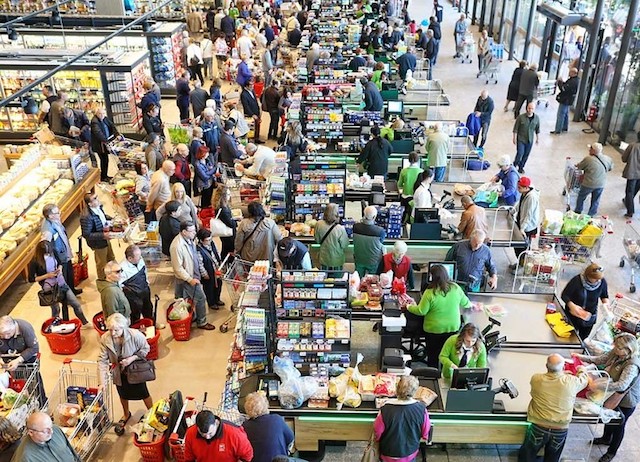
You don’t know Hitesh Palta. Not many people do. Mr Palta is not famous. He doesn’t have a fancy title or a massive Instagram following. He doesn’t occupy a powerful position in government, and nobody asked his opinion about how to alleviate our current global health and economic crisis.
Mr Palta is the owner of a small independent supermarket in Altona, a suburb in the south-west of Melbourne. When he saw scenes of panic-buying across Australia on the news, he feared for the elderly in the community. He decided to do something to help.
Last weekend, Mr Palta extended his store’s opening hours, by an hour in the morning, exclusively to serve the elderly. He was the first retailer in Australia to do so. The next day, Australia’s two biggest supermarket chains announced they would follow suit.
As fear changes our behaviour and social contagion takes hold. It’s our quiet leaders, those with the least authority who are making the most difference.
To our grocery store managers, checkout operators, shelf stackers, warehouse supervisors, logistics co-ordinators and delivery drivers, thank you for caring to lead.
Image by Paul Townsend
On Safety
filed in Worldview
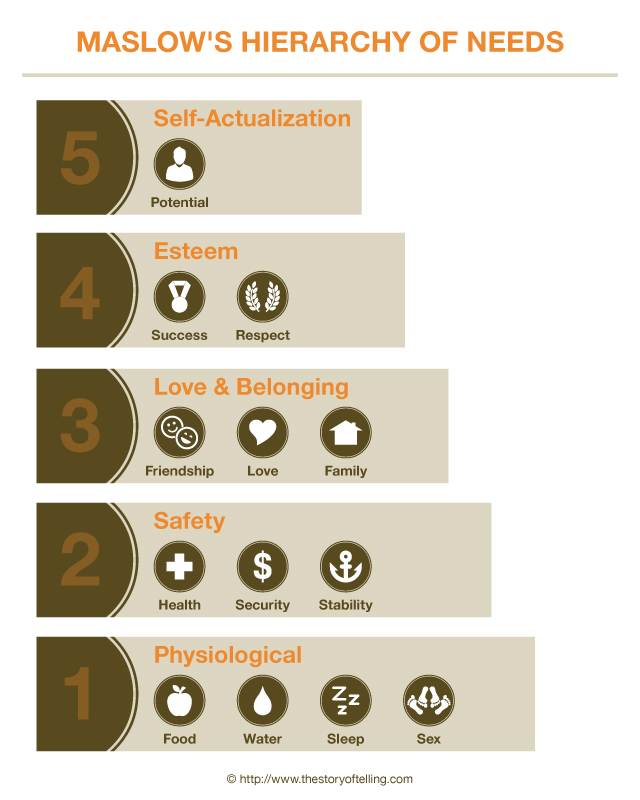
We know, as Maslow described, that our most basic needs are physiological and safety.
If these needs aren’t met we stumble, we stall and we stop being caring and creative.
Safety is a state, but it’s also a feeling.
We can be perfectly safe yet feel fearful.
Fear is more contagious than any virus.
And once it gets hold it’s hard to eradicate.
Great leaders don’t just ensure our safety, they also to make us feel safe.
That’s the challenge we face today and every day, to lead with empathy for the people who look to us.
The Efficiency Paradox
filed in Meaningful Work, Worldview
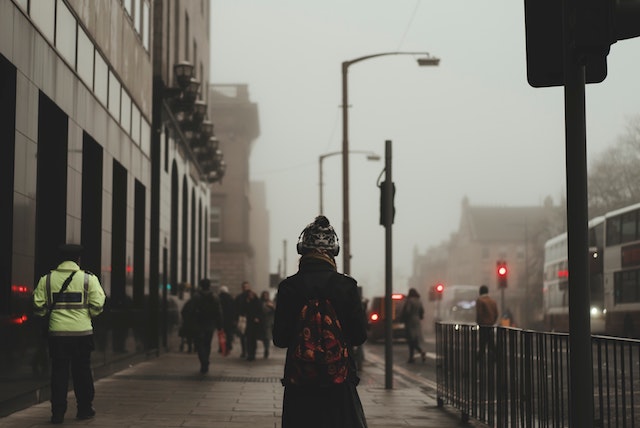
The young woman got off the tram, carried along amid the throng on their way to the various law firms along Collins Street. She walked briskly, heels clacking, her big Beats headphones clamped over her ears. Two bags were slung across her body. One leather contained her laptop, the other made of cloth held a ball of the bright yellow wool trailing from the needles she held in her hands.
Her hands worked furiously as she walked—one plain, one purl, one plain, one purl. The needles continued to click in and out through the yellow wool as she knitted, listened and walked, walked, knitted and listened—without ever needing to stop or look down. She’d have a podcast and half a scarf under her belt before she reached the office.
This woman was making efficient use of her time, but I’m not sure that’s the same as making the most of it. Just because it’s possible to do two or three things at once doesn’t mean we should.
What are we trading for efficiency? What’s the cost to us?
Image by Ross Sneddon
Promises Worth Keeping
filed in Meaningful Work, Success, Worldview
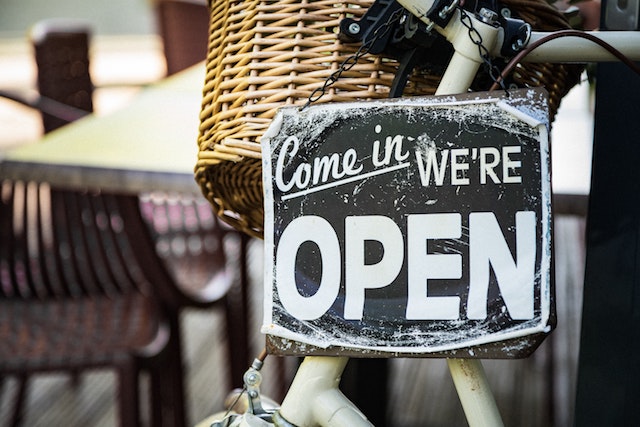
While I was out walking this weekend I came across a sign on a shop door detailing the opening times. It read:
MONDAYS—probably
TUESDAYS-probably
WEDNESDAYS—probably not sure Not SURE!
THURSDAYS—OPEN
FRIDAYS—OPEN
SATURDAYS—OPEN
SUNDAYS—OPEN
MAY BE LATER FOR OPENING (SORRY! LIFELONG HABIT)
BUT TRYING FOR 3 PM-9 PM
It’s easy for a sometimes probably, to become a maybe never.
What promises are you making to yourself and others that are worth keeping?
This is a photo of the sign.
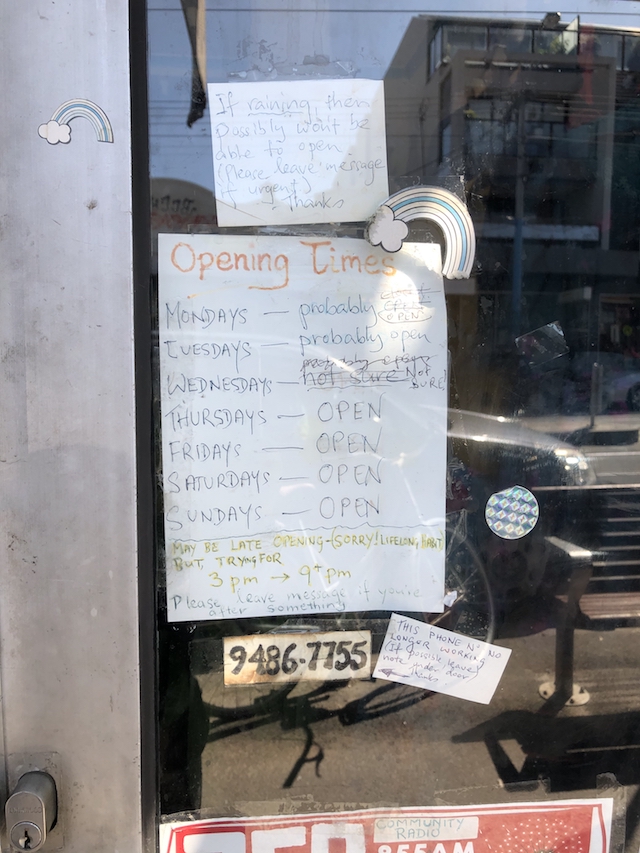
Image by Richard Balog
The Unexpected

Think about an instance of great service you experienced in the past week. I can guarantee what made it special was how it was delivered, not what was delivered.
Contrary to what we often believe, people want more than what was expected.
We consistently underrate, undervalue, and underutilise our humanity.
And we always have the opportunity to do the unexpected.
Image by Kate Townsend